Reading into the Winter Solstice
Stories that are out of this world, from three of my fellow Earthlings
Photo by Greg Rakozy on Unsplash
I love everything about the winter solstice. For years I, like most people, thought of the winter solstice as an entire day on the Gregorian calendar, the shortest one of the year. However, the solstice really lasts only a moment. The winter solstice is the precise moment when our hemisphere is tilted as far away from the sun as it can get. From that fleeting moment on, our half of the spinning blue marble will begin to inch closer and closer to the sun, a simple scientific fact that always fills me with joy.
The winter solstice is like New Year’s Day in that it too is a fresh beginning, an invitation to pause and think about the passage of time, and our time on the planet. However, these times of year are also completely different, in that New Year’s is a deeply anthropocentric holiday, and the other is, well, an astronomical event. A cosmic occurrence that predates human existence as we know it by such an incredibly vast span of time that we can’t quite get our wee brains around it. I can’t, anyway. But it’s fun to try, and I make a point of it every December 21.
On the day of the winter solstice, I go for a walk at noon, to cast my longest shadow of the year. I go out after dark, to look up at the night sky, and think about how much we humans have in common with the stars. We’re made of the same stuff. Humans are just one among many carbon-based lifeforms on the planet. We’re hardly the centre of the universe, even if we are having a disproportionate, largely catastrophic effect on our little corner thereof. I know this, of course, all year round, but it’s just so easy to forget, to lose this perspective entirely by focusing on the tiny details of my life, which tend to proliferate in mid-December. Stocking stuffers. Tracking numbers. Spirit Week. (Is it Mad for Plaid Monday or Twinsies Tuesday? Which kid needs the shirt that’s probably in the laundry basket?)
Don’t get me wrong. I will always love stories about human families. Give me a super in-depth, too-close-for-comfort character study, or an epic intergenerational family saga that revolves around a secret, and I will happily get lost for hours on end. But this year, as we head into the winter solstice and the ensuing holiday mayhem, I found myself craving a little distance from these books. I wanted to read something that was, literally, out of this world—but I didn’t know where to start.
So I turned to my fellow Substackers for advice, and they totally delivered!
My first recommendation came from Laura Sackton, of
, a weekly newsletter “celebrating queer lit and tasty treats.” Now, while I have proven myself incapable, time and again, of baking anything more complicated than a banana muffin, I do love reading about Laura’s culinary creations, and have never once been disappointed upon picking up one of her book recommendations. Her posts are unfailingly warm, thoughtful, and packed full of titles I know I’ll like, but might never have come across on my own. This Monk and Robot series is a case in point, as I’ve always been a little intimidated by science fiction, and was unfamiliar with the author, Becky Chambers.Laura describes these books as “lovely, and also kind of philosophical, and also just so heartwarming and comforting.” Though I’m only halfway through the series, I happily concur with her take on it. I’m loving this tale of unlikely friendship between Sibling Dex, a tea monk, and Mosscap, a wild-built robot—so much so that I find myself trying to read more slowly, because these books are so short and I don’t want to leave their world. I plan to reread both before I return them, with great reluctance, to the library.
My second recommendation comes from Nia Carnelio over at
. She writes:“Human beings have a remarkable ability to accept the abnormal and make it normal.”
Project Hail Mary by Andy Weir is a book full of heart, humour, and that unique ‘humaness’ we all loved in The Martian (at least I know I did). I enjoyed the book thoroughly, despite some of the science-y stuff going over my head. My absolute favourite bit in the book (among many others) is how realistic I found the protagonist. Cause you know, not everyone’s going to be thrilled to go into space and potentially save humanity, at the cost of never seeing their loved ones again or even surviving!
10/10 for finding friends in unexpected places and a gloriously fun-to-read space adventure.
I put this book on my library holds list immediately…only to discover the estimated wait was 36 weeks! It seems Nia is not the only one who likes this book. I hope to get my hands on a copy before the winter solstice is out. Or at least before the summer solstice! In the meantime, I’ll be catching up on her newsletter. I’m a new subscriber but I know I’m going to love it, because Nia writes about the things we’re all thinking about, that we really want to talk about…but mostly don’t. You know, those ‘uncomfortable’ topics, like money, and adult friendships, that will only become comfortable if we actually discuss them as much as we all secretly obsess. I can’t wait to dig in.
And finally…
This recommendation comes from
of , a weekly "love letter to children’s books, old and newer, and the magic of reading them together." Though my own kids currently see themselves as "too old" for picture books, I enjoy receiving Sarah's weekly newsletter, for reasons both practical--I have a niece and nephews who are still little, for whom I can't resist buying books--and deeply nostalgic. I have so many fond memories of reading to my girls, and of hearing them read to me.Also, I don’t mind admitting that, at almost forty-three years old, I do not feel “too old” for a beautifully written and illustrated picture book like this one. I hope to get a copy into the house over the Christmas break, when there will be a few extra kids around who might pick it up and ask me to read it. In her review, Sarah reveals that there is “action aplenty: a chase, a battle, a loss. There are strange creatures: Moonbots, Moonmice, and giant Glowworms. There is struggle: to grow up, to find one’s path, to be of service and value in the world (or the galaxy, as it were).”
I may no longer be a kid, but I relate to that struggle. So much.
The word solstice, Merriam-Webster tells me, comes from the Latin word for sun (sol) and sistere (Latin for “to stand still”). It was coined by the ancients to describe what they were seeing in the sky. For a few days each year, the sun appears to pause in its tracks; the change in noontime elevation over this period is so slight it hardly registers on a sundial or shadow clock.
As both a writer and a mother, I don’t need the sun to show me what barely perceptible progress looks like. Frankly, I am viscerally familiar with the concept, as it relates to both creative work and raising children, and am frequently undone by it. It is difficult, in a society that is obsessed with measurable achievement, to feel like anything but a failure when you don’t have a bunch of shiny accomplishments to show off at the end of another trip around the sun. To feel like it’s not enough, just to have made it.
But it is.
It really, really is.
I could go on about this fact at length, but I can’t possibly improve upon the way Mosscap expresses it to Dex in A Psalm for the Wild Built:
“You keep asking me why your work is not enough, and I don’t know how to answer that, because it is enough to just exist in the world and marvel at it. You don’t need to justify that, or earn it. You are allowed to just live. That is all most animals do.”
Before I came across this passage, I was struggling with whether or not to write a final, celebratory, year-in-review letter for the last week of December, full of ‘favourites,’ ‘bests,’ and ‘wins’. Part of me really did not want to, and I didn’t know why, But now I do.
I don’t want to rank, or even count up, all the books I’ve read this year. It’s enough to have read them, and to have marveled at them, here. I don’t need to count my readers, because any number of you—any one of you—would be enough.
Your views, hearts, comments, and messages have meant so much to me—not the total number thereof, which Substack keeps urging me to focus on—but individually. I started this newsletter on an impulse, somewhere between a lark and an act of desperation. I didn’t have a plan or a purpose so much as I had a need, pure and simple, to engage with a supportive community. I jumped in without even really knowing if there was one to be found here. So thank you, all of you, for existing in the world and reading my rambling letters.
That said, if there’s a better time to pause, to just live, than the solstice, I can’t imagine it.
So, this will be my last letter of the year. I’ll be back in your inbox sometime in January, 2023.
Until we meet again, wishing you all a solstice full of books and peaceful moments in which to read them!

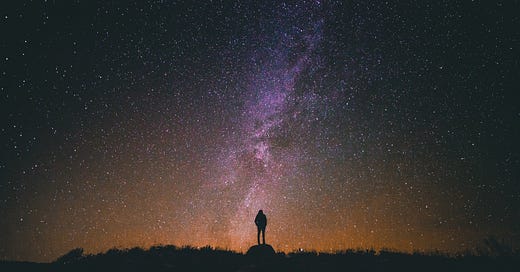



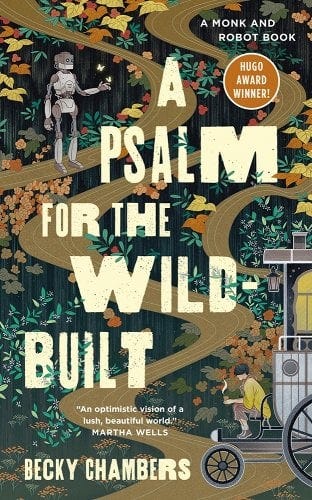
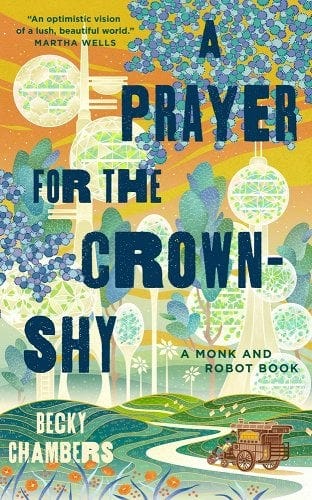
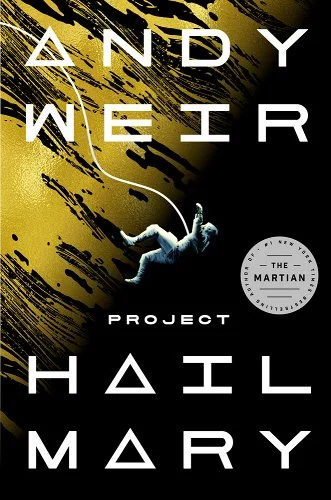
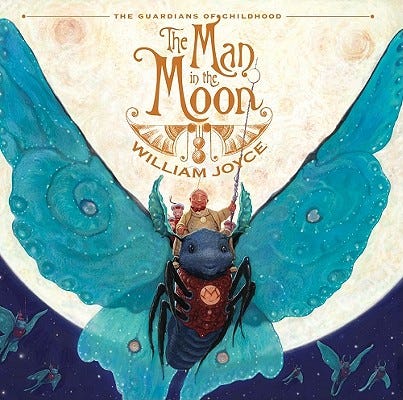
This is such a beautiful post! I, too, love that passage from Monk & Robot and I love how you think about it in terms of all the rush and list-making etc. that happens this time of year. (Some of which I love, but it does get to be too much.)